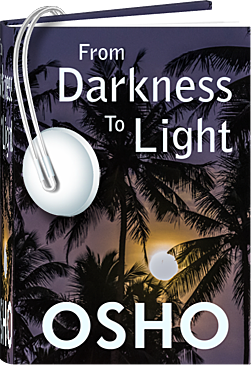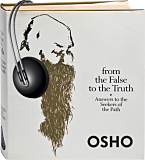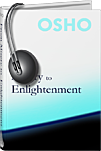From Darkness to Light
Audiobook Series
In stock
In this series of comprehensive, colorful and profound talks, Osho examines the ways in which the institutions of society have systematically crippled man′s authenticity and individuality. He goes on to point to man′s true potential for freedom, found within each of us.
In this series of comprehensive, colorful and profound talks, Osho examines the ways in which the institutions of society have systematically crippled man′s authenticity and individuality. He goes on to point to man′s true potential for freedom, found within each of us.
Excerpt from: From Darkness to Light, Chapter 4
Osho,
Would you please comment on the death penalty?
"The death penalty is a degrading proof of man’s inhumanity to man. It shows that man is still living in the barbarous age. Civilization still remains an idea – it has not become a reality.
"The death penalty is so idiotic that you will have to look from all the aspects to understand why such an idiotic thing has continued in all the civilizations, cultures, nations. Even in a few countries where it was dropped it has been adopted again. In a few other countries where it has been dropped, it has been replaced by life imprisonment - which is worse than the death penalty itself. It is better to die in a single moment than to go on dying slowly for fifty years, sixty years.
"Changing from the death penalty to a life sentence is going not towards civilization, it is going still deeper into barbarous, inhuman darkness, unconsciousness.
"The first thing to remember is that the death penalty is not really a punishment. If you cannot give life as a reward, you cannot give death as a penalty. This is a simple logic, there cannot be two opinions about it. If you cannot give life to people, what right have you to take their life?
"I am reminded of a true story. It happened that two criminals were in search of a treasure that was hidden in a castle. Many people had tried but had not found the way; somehow these criminals stumbled upon the treasure. The treasure was so vast that one of the two was not willing to divide it. The only way was to kill the other, but in killing the other he might get caught. There was danger, and now he could not take any risk because the whole treasure was in his hands.
"He managed a very cunning way. He disappeared and spread the rumor that he had been murdered, and he left all the evidence that would prove that his friend was the murderer. The friend was caught with all the proofs: his revolver was there; two bullets were missing, and his fingerprints were on the revolver. His handkerchief with his name embroidered on it had fallen…. And only he knew the place where the friend was hiding in the jungles against the police, because they had done other crimes also, and there was a price on both of them to be caught alive or dead.
"He could not prove his innocence; there was no way – everything went against him. He was given the death penalty. He knew he had not murdered his friend; he knew that this whole thing was a plot. His friend was not dead; it was just to keep the whole treasure, that the friend had removed him in a legal way, out of the way.
"But he escaped from the prison before he was executed. After twelve years he came into the court, dragging the dead body of a very famous politician, a rich man of the city, and he told the court – it was the same judge – ‘I have murdered this man, and I dare you to punish me. But first let me tell you the whole story. I am the man who twelve years ago you had sentenced to death. I escaped from the prison because I was absolutely innocent, but I had no proof.’
"In fact innocence has never any proof. Proofs are for the crime or against the crime, but innocence has no proof.
"He said, ‘Now I have murdered the man you charged me twelve years ago for having murdered – this is the man. If your first judgment was right then you cannot punish me again for the same murder because that man was murdered twelve years ago. And if your first judgment was not right, how can you be sure that your second judgment is going to be right?&rsquot;
"Can you punish a man for murdering the same man twice?
"It is really very difficult to decide.
"He said, ‘The only crime I have committed is escaping from the jail, but can you call it a crime? When you punish an innocent man with death, who is the criminal – you or me?’ And this man plotted the whole thing; he managed all those proofs because he had my revolver, he had my handkerchief. He managed all those proofs, escaped from there with the treasure that we had both found, became a rich man, famous. He changed his name, his personality, shaved off his beard, changed his hair-do, and became respectable; he opened a hospital, a school, made a temple. And this is the man who managed the plot to show he had been murdered.
"In that way he was saved from the punishment for other crimes for which the police were searching for him; now he has been murdered – so that file is closed. He killed two birds by one stone: he killed me, not directly, but through a legal procedure. He used all you idiots to kill me, so that he would become the whole owner of the treasure – and he did. By the same strategy he removed all crimes against him. The file was closed, the man was dead – of course, his body was not found. The murderer had been very clever, because he was a known criminal.’
"The story has many implications. The man asked, ‘If I was sentenced to death and I had not escaped and was executed, what would have been the case now? If it had come to be known that the man thought to be murdered is alive, would you be able to give me my life back? If you cannot give my life back, what right have you to take it away?’
"It is said the judge resigned, apologized to the man and said, ‘Perhaps I have done many crimes in my life.’
"A strange thing all over the world is that unless you are proved innocent, you are guilty. This goes against all humanitarian ideals, democracy, freedom, respect for individuality; it goes against all. The rule should be: unless you are proved guilty you are innocent. Yes, it is said in words, but in reality the case is just the opposite." Osho
Would you please comment on the death penalty?
"The death penalty is a degrading proof of man’s inhumanity to man. It shows that man is still living in the barbarous age. Civilization still remains an idea – it has not become a reality.
"The death penalty is so idiotic that you will have to look from all the aspects to understand why such an idiotic thing has continued in all the civilizations, cultures, nations. Even in a few countries where it was dropped it has been adopted again. In a few other countries where it has been dropped, it has been replaced by life imprisonment - which is worse than the death penalty itself. It is better to die in a single moment than to go on dying slowly for fifty years, sixty years.
"Changing from the death penalty to a life sentence is going not towards civilization, it is going still deeper into barbarous, inhuman darkness, unconsciousness.
"The first thing to remember is that the death penalty is not really a punishment. If you cannot give life as a reward, you cannot give death as a penalty. This is a simple logic, there cannot be two opinions about it. If you cannot give life to people, what right have you to take their life?
"I am reminded of a true story. It happened that two criminals were in search of a treasure that was hidden in a castle. Many people had tried but had not found the way; somehow these criminals stumbled upon the treasure. The treasure was so vast that one of the two was not willing to divide it. The only way was to kill the other, but in killing the other he might get caught. There was danger, and now he could not take any risk because the whole treasure was in his hands.
"He managed a very cunning way. He disappeared and spread the rumor that he had been murdered, and he left all the evidence that would prove that his friend was the murderer. The friend was caught with all the proofs: his revolver was there; two bullets were missing, and his fingerprints were on the revolver. His handkerchief with his name embroidered on it had fallen…. And only he knew the place where the friend was hiding in the jungles against the police, because they had done other crimes also, and there was a price on both of them to be caught alive or dead.
"He could not prove his innocence; there was no way – everything went against him. He was given the death penalty. He knew he had not murdered his friend; he knew that this whole thing was a plot. His friend was not dead; it was just to keep the whole treasure, that the friend had removed him in a legal way, out of the way.
"But he escaped from the prison before he was executed. After twelve years he came into the court, dragging the dead body of a very famous politician, a rich man of the city, and he told the court – it was the same judge – ‘I have murdered this man, and I dare you to punish me. But first let me tell you the whole story. I am the man who twelve years ago you had sentenced to death. I escaped from the prison because I was absolutely innocent, but I had no proof.’
"In fact innocence has never any proof. Proofs are for the crime or against the crime, but innocence has no proof.
"He said, ‘Now I have murdered the man you charged me twelve years ago for having murdered – this is the man. If your first judgment was right then you cannot punish me again for the same murder because that man was murdered twelve years ago. And if your first judgment was not right, how can you be sure that your second judgment is going to be right?&rsquot;
"Can you punish a man for murdering the same man twice?
"It is really very difficult to decide.
"He said, ‘The only crime I have committed is escaping from the jail, but can you call it a crime? When you punish an innocent man with death, who is the criminal – you or me?’ And this man plotted the whole thing; he managed all those proofs because he had my revolver, he had my handkerchief. He managed all those proofs, escaped from there with the treasure that we had both found, became a rich man, famous. He changed his name, his personality, shaved off his beard, changed his hair-do, and became respectable; he opened a hospital, a school, made a temple. And this is the man who managed the plot to show he had been murdered.
"In that way he was saved from the punishment for other crimes for which the police were searching for him; now he has been murdered – so that file is closed. He killed two birds by one stone: he killed me, not directly, but through a legal procedure. He used all you idiots to kill me, so that he would become the whole owner of the treasure – and he did. By the same strategy he removed all crimes against him. The file was closed, the man was dead – of course, his body was not found. The murderer had been very clever, because he was a known criminal.’
"The story has many implications. The man asked, ‘If I was sentenced to death and I had not escaped and was executed, what would have been the case now? If it had come to be known that the man thought to be murdered is alive, would you be able to give me my life back? If you cannot give my life back, what right have you to take it away?’
"It is said the judge resigned, apologized to the man and said, ‘Perhaps I have done many crimes in my life.’
"A strange thing all over the world is that unless you are proved innocent, you are guilty. This goes against all humanitarian ideals, democracy, freedom, respect for individuality; it goes against all. The rule should be: unless you are proved guilty you are innocent. Yes, it is said in words, but in reality the case is just the opposite." Osho
| Publisher | Osho Media International |
|---|---|
| Type | Series of Talks |









The information below is required for social login
Sign In or Create Account
Create New Account